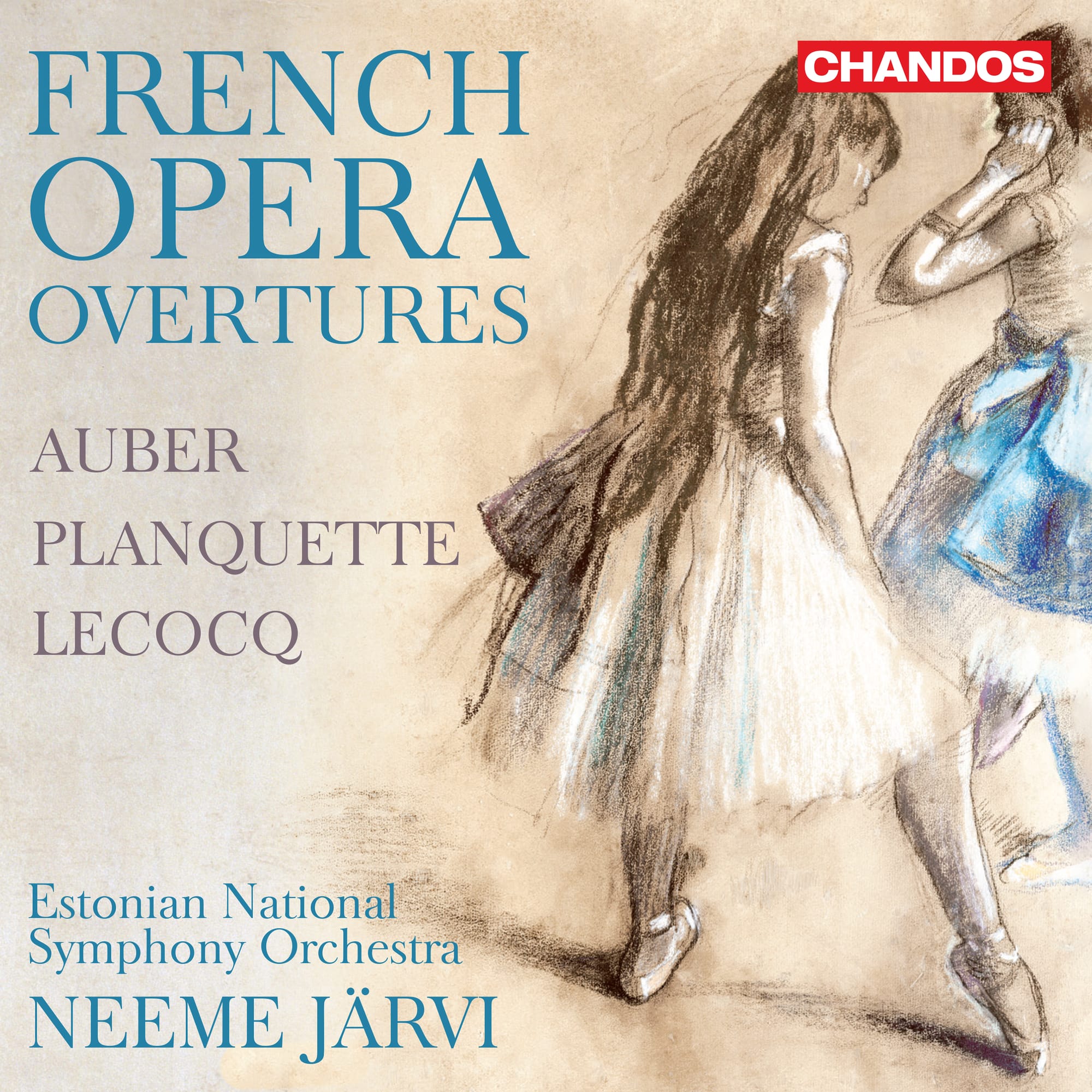Frothy delights from France via Estonia!

The esteemed conductor Neeme Järvi leads the Estonian National Symphony Orchestra in this wonderfully upbeat disc; bu a disc that has a real purpose. the Works of Auber, Daniel-François-Esprit Auber (782-1871), Jean Robert Planquette (1848-1903) and Alexandre Charles Lecocq (1832-1918) remain little-known, at least in the UK, todauy. Chandos’disc aims to set this right and, hopefully, point the way to further exploration.
Le Domino noir (premiered 1837) is probably Auber’s best down work. Set in Madrid in 1780, the idea of a French opera set in Spain would of course reach its climax in Bizet’s Carmen. The “domino” of the title is a half-black, half-white mask worn by a nun who sneaks out of her convent to attend a masked ball on the eve of her vows. The scoring of the opening seems impeccably French: bright, vivacious. Järvi brings a rhythmic lift to the performance that is to characterise the entire disc. Note the Rossini-like crescendo near he end:
The recording of the full work by Richard Bonynge is well worth searching out. In the meantime, here’s a full performance from Compeigne conducted by Michel Swierczewski. Soloists include Sophie Fournier (Angèle), Alain Gabriel (Horace):
The opera La Muette de Portici (The Mute Girl of Portici, 1828) was part of a string of French operas set in Spain that led to Bizet’s Carmen. The plot actually centres on the girl’s – Fenella’s – brother, Masanello, and his revolutionary activities. The rebellion fails, Masaniello dies from poison and Fenella’s death by throwing herself from a terrace. Versusius also erupts during this event-filled opera. Apparently the operas performance in Brussels sparked the Belgian revolution in August 1830, leading to that territory’s independence from the Dutch. Auber’s opera impressed Wagner, no less. The Overture has real dramatic sweep:
The Brucie Bonus this time is not a complete performance of the opera, but a move to stage left for Thlberg’s solo piano Grande fantaisie sur des motifs de l’opéra La muette de portici de D. F. E. Auber, Op. 52, performed here by Mark Viner:
Both overures so far have been fairly boisterous. The next, and Auber’s last on the disc, Les Diamantes de la coronne (1841), begins in a more restrained fashion. A story of a desperate queen, faced to see her crown jewels, who substitutes them with fakes, obtained by a group of counterfeiters led by a nobleman, Don Henrique. The Overture fizzes along; it’s amazing how Järvi enables he treble-donated scoring to sound convincing, and how the Estonian winds in this piece particularly shine:
As yet another bonus, here’s the act 1 finale. The scenario: the bandits disguised as monks escape from soldiers, while their leader La Catarina and her assistant Rebelledo escape through a secret passage.
Conductor: Edmon Colomer
Catarina: Ghyslaine Raphanel
Don Henrique: Christophe Einhorn
Rebolledo: Armand Arapian
Mugnoz: Nicolas Gambotti
Choeurs Cori Spezzati
Orchestre de Picardie
Just one Overture from Planquette, Les Cloches de Courneville (The Bells of Courneville, 1877). No missing the bell imitations from the orchestra in this one; but don’t forget the deliciously expressive, sweet and tender moments here. In the opera, the ringing out of the bells signal the return of a castle’s true owners (the Castle Courneville) . His is an eminently enjoyable, imaginative overture. I wonder if the elongation of a chord at the end is noted in the score? It’s difficult to tell: IMSLP only gives a flute part which has those bars as a set number of rests …
Finally, music by Alexandre Charles Lecocq. It was Lecocq who shared joint prize with Bizet for Le douceur Miracle) in a competition. Written 1943 and revised in 1947, Mam’zelle Angot Here, we hear the Overture plus a suite put together by Gordon Jacob. I wonder if it’s just me that heard hints of Petrushka (the fairground hurdy-gurdy) in the Overture?:
The music is delightful: listen to the percussion encrustations of line in the first excerpt from act 1:
The Jacob arrangements formed a ballet given at Sadler’s Wells in 1947, starring Margot Fonteyn (there was a revival at Covent Garden in 1980). One can hear how this would have worked so well; the music is buoyant and often delicate. For the latter, try this:
There is some lovely solo violin work by leader Train Ruubel in the lovely Adagio, and some beautiful woodwind moments, too, before a blossoming of Lecocq’s great tune:
A beautifully performed and recorded disc – and what repertoire! A celebration of life itself.
The disc is available at Amazon here.






.jpg?w=670&resize=670,446&ssl=1)


%20Craig%20Fuller.jpg?w=160&resize=160,160&ssl=1)

